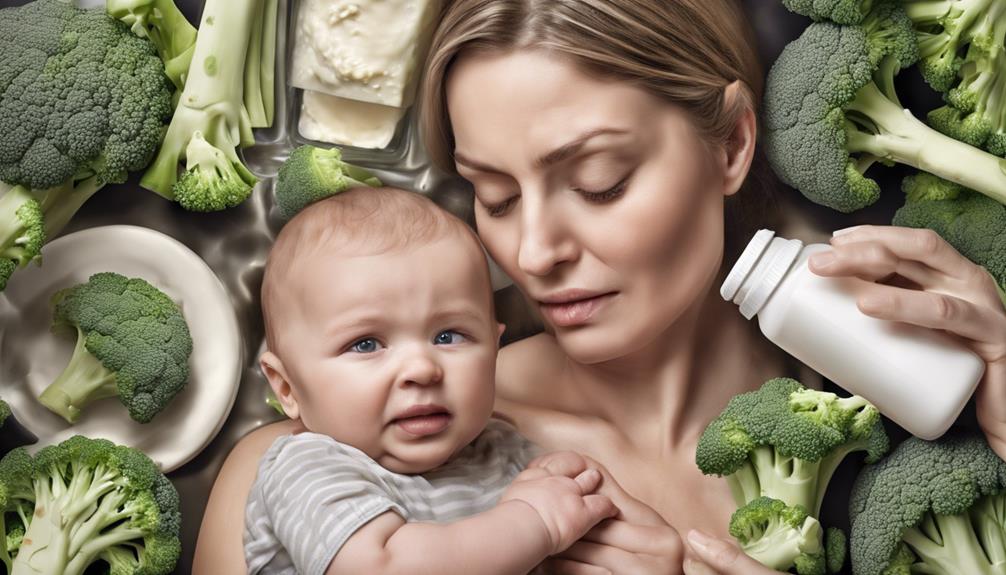Let's navigate the labyrinth of the gassy baby's world, where the journey through breastfeeding diet tips can lead to a happier tummy.
Wondering how a simple change in diet could ease your little one's discomfort and bring peace to your feeding routine?
Let's uncover the secrets behind a well-balanced breastfeeding diet and its impact on your baby's digestive woes.
Key Takeaways
- Avoid gas-inducing foods like cruciferous vegetables and citrus fruits.
- Opt for digestive-friendly options like probiotic-rich foods and lean proteins.
- Stay hydrated to support milk production and aid baby's digestion.
- Seek professional guidance for personalized advice on managing gas issues in breastfeeding babies.
Common Culprits in Breastfeeding Diet
When considering the common culprits in a breastfeeding diet, it's important to be mindful of certain foods that can contribute to gas discomfort in your baby. Breast milk is the primary source of nutrition for your little one, and what you consume can directly impact your baby's digestive system. Some infants may have food sensitivities that can lead to gas bubbles and discomfort.
Certain foods in the maternal diet can produce gas in breastfed babies, such as cruciferous vegetables like broccoli and cauliflower, citrus fruits such as oranges and lemons, spicy foods like chili peppers and hot sauce, and caffeine-containing beverages like coffee and tea. Additionally, dairy products should be avoided for lactose intolerant babies as they can cause gas issues in breastfeeding infants.
To help alleviate gas discomfort, consider techniques like paced bottle feeding and consult with your pediatrician about using simethicone drops if needed. Remember, a balanced and mindful maternal diet can promote a happier tummy for your baby.
Foods to Avoid for Gas Relief

To ease your baby's gas discomfort, consider eliminating cruciferous vegetables like broccoli and cauliflower from your breastfeeding diet. These foods can contribute to gassiness in breastfed babies.
In addition to avoiding cruciferous vegetables, citrus fruits like oranges and lemons, spicy foods such as chili peppers and hot sauce, and caffeine-containing beverages like coffee and tea may also increase gas discomfort in nursing infants. Dairy products should be avoided if your baby is lactose intolerant, as lactose can lead to gas issues.
Making these dietary adjustments can help alleviate your breastfed baby's gas troubles and promote a happier tummy. Remember, every baby is different, so it might take some trial and error to figure out what foods are causing discomfort. Stay patient and observant, and consult your healthcare provider if you have concerns about your baby's gas.
Foods to Include for Digestive Comfort
If you're looking to soothe your baby's tummy troubles, consider incorporating these digestive-friendly foods into your breastfeeding diet.
Probiotic-rich foods like yogurt can help promote a healthy gut flora for your baby, reducing gas and digestive discomfort.
Foods high in fiber such as whole grains, fruits, and vegetables aid in smooth digestion for both you and your little one, minimizing gas issues.
Lean proteins like chicken, fish, and tofu provide essential nutrients for you and help in producing quality breast milk for your baby's digestive health.
Hydrating foods, such as water-rich fruits and vegetables, support proper hydration for you, indirectly benefiting your baby's digestion and reducing gas.
Including foods rich in essential fatty acids like salmon, flaxseeds, and walnuts can contribute to overall digestive comfort for both of you.
Hydration and Its Impact

Staying well-hydrated is essential for breastfeeding mothers as it not only supports milk production but also plays a key role in aiding your baby's digestion. Ensuring adequate hydration is critical for maintaining ideal milk composition and preventing issues like dehydration, which can lead to a decrease in milk supply and result in concentrated breast milk that may discomfort your baby.
Here are some practical tips to help you stay hydrated and support both you and your baby's well-being:
- Keep a water bottle handy throughout the day to remind you to drink regularly.
- Set a hydration goal for yourself to make sure you're consuming enough water.
- Include hydrating foods like fruits and vegetables in your diet to supplement your water intake.
- Opt for water over sugary or caffeinated beverages to maintain proper hydration levels.
- Listen to your body's cues for thirst and drink whenever you feel the need to stay adequately hydrated.
Seeking Professional Guidance
Seeking professional guidance from a lactation consultant or pediatrician is essential for addressing gas discomfort in breastfed babies effectively. These experts can help identify specific dietary factors affecting your little one's digestive system and provide tailored advice to alleviate gas issues.
By consulting with a lactation consultant, you can learn about adjusting breastfeeding techniques to reduce the intake of much air, which can lead to excess gas in your baby's belly. Pediatricians may offer valuable insights on potential dietary changes and feeding strategies to help alleviate your baby's gas and make your little one feel more comfortable.
In some cases, trying a specialized formula or ensuring extra burping during feeding sessions may also be recommended by these professionals to promote a happier tummy for your breastfed baby. Seeking professional help is a proactive step towards ensuring your little one's well-being and addressing any concerns related to gas discomfort effectively.
Frequently Asked Questions
What Should a Breastfeeding Mother With Gassy Babies Eat?
We focus on choosing foods that won't upset our baby's tummy. Avoiding gas-triggering foods like beans and opting for lean proteins helps. Probiotic-rich yogurt aids digestion. Hydration and fiber from fruits keep things moving. Monitoring allergens is key for a happy baby.
How Can I Prevent My Breastfed Baby From Getting Gas?
We focus on improving latch and monitoring milk flow to prevent gas in our breastfed baby. We consider our diet's impact, introduce paced feeding, and seek guidance from lactation consultants. Our goal is a happier tummy for our little one.
Can What I Eat Upset My Breastfed Baby's Stomach?
Absolutely, what we eat can affect our breastfed babies' stomachs! Certain foods like dairy or spicy dishes may lead to tummy troubles for them. Keeping a food diary and seeking advice can help pinpoint the culprits.
Why Does My Breastfed Baby Have Stinky Gas?
Sure thing! Sometimes, our breastfed baby might have stinky gas due to foods we eat. Certain foods like garlic or cruciferous veggies can be the culprits. Keeping a food diary can help pinpoint triggers for a happier tummy.
Conclusion
Let's nourish our little ones with care and attention, ensuring their tiny tummies are happy and content. By making small adjustments to our breastfeeding diet, we can ease their discomfort and promote better digestion.
Remember, every burp and smile is a sign of a job well done. Stay hydrated, choose the right foods, and seek support when needed.
Together, we can create a soothing feeding experience for our precious babies.










